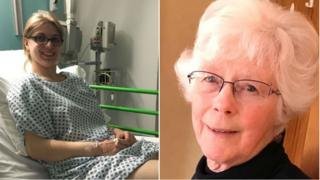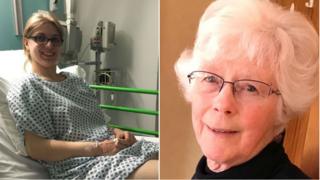
 Image copyright
Image copyright
Bev Pearson/Liz Goldfinch
Transplant patient Lucy Pearson and Liz Goldfinch, who has a rare lung disease, were initially missed of the government’s shielding list
As the coronavirus outbreak spread across the UK in the spring, about two million people with certain health conditions were advised to “shield” – to stay at home and adopt stricter distancing measures than most other people.
But in April, BBC News revealed 600,000 people had been left off the government’s “high risk” register despite meeting the criteria, including transplant patients, people with asthma and some with rare lung diseases.
The register was being used to identify people who should be given priority for things such as supermarket delivery slots and so, for many who were missed out, the initial concerns were about getting basic food and medical supplies.
Last week it was announced those shielding in England could meet other people outdoors from 6 July and that shielding was due to end on 1 August. So how have those who were not on the initial list dealt with lockdown and what sort of support have they received?
‘It was touch and go for about 10 days’
Image copyright
Bev Pearson
Lucy Pearson, from Whitsbury in Fordingbridge, Hampshire, had a heart transplant 14 years ago and has no spleen.
“We live five miles from the nearest town so it’s been difficult and it really was touch and go for about 10 days,” said Bev Pearson, mother of 20-year-old Lucy.
“Neighbours offered to shop for us and although we did accept some help we felt awkward because we didn’t want to put others at risk by looking after us. I don’t like putting people in that position.
“Despite registering her as high risk at the start of lockdown, we got our first text from the government on 14 May.”
Since week nine of lockdown, Mrs Pearson said her daughter had been receiving a weekly food package from the government and the family had also managed to book supermarket delivery slots after she was added to the shielding list.
During week 14, she also received her first letter from the government.
“Thankfully, it’s all now sorted out and an NHS responder in the village gets her medication once a month,” Mrs Pearson said.
Miss Pearson described her experience of lockdown as frustrating and said she felt annoyed with people who had broken lockdown rules.
“I can’t wait to go out. I really miss the close contact with my Granny and Granddad that we all take for granted.
“I have done lots of reading and listening to music though.”
‘We have played lots of Scrabble’
Image copyright
Liz Goldfinch
Liz Goldfinch, 79, from Droitwich in Worcestershire, has been shielding with her 88-year-old husband, Oli, as she has cryptogenic organising pneumonia (COP) – a rare lung condition – and Parkinson’s disease.
“Soon after I added myself to the list on the government website, Sainsbury’s and Tesco emailed me to tell me I had been identified as high risk and I’ve had regular slots since then,” she said.
“Eventually I got a call from my GP and was told I had initially been missed because my illness is rare and not straightforward.
“I also got a consultant letter. So really it’s all been fine since then.
“I also started getting free food packages delivered but I didn’t need them so I sent the food to the food bank. It was a good selection though – enough food for one person for a week, a balanced diet.”
Mrs Goldfinch said her friend had been delivering her prescriptions, while her son and neighbours had also been “very helpful and checking on us regularly”.
“I feel lucky that I’ve got Oli with me and I’ve not been alone – it would have been very difficult without him,” she added.
“I’ve had time to cook some half decent meals – I’m not the best cook, we have also played lots of Scrabble, cleared out the study, taken part in a Zoom quiz once a fortnight with ex-colleagues and it’s been very restful – a bit like being on holiday but without being able to go anywhere.”
‘I got nothing – not a text or food, or anything’
Mother-of-four Ruth – who did not want to give her surname – is from Somerset and has severe asthma.
“I am a high risk asthmatic on fexafenigan, montelucast and steroid inhalers, and am under a consultant at the hospital,” the 39-year-old said.
“When I heard nothing from the government I registered on the government website.
“Since registering I have had heard nothing – not a text or food, or anything.
“I’ve never been asked to shield and never received any support.
“It’s been a huge worry especially as at the beginning of lockdown I was extremely unwell and was put on antibiotics and steroids.
“I believe this put me at quite a high risk as I was so vulnerable with my immune system at that time.”
Ruth said it had been particularly difficult as she has four children and they had been forced to rely on family and friends for supplies.
Who has needed to shield?
- Those most at risk, who include:
- Solid organ transplant recipients
- Some people with cancer who are undergoing treatments such as chemotherapy and radiotherapy
- People on immunosuppressant drugs
- Women who are pregnant and have heart disease
- People with severe respiratory conditions – cystic fibrosis, severe asthma and COPD
- Some people with rare diseases such as severe combined immunodeficiency
Image copyright
Public Health England
The government initially said about 1.5 million people had been identified as needing to “shield”.
By late June there were more than 2.2 million people on the list.
At the same time people were missed, others were initially added to the list but later removed, including deceased patients, for which NHS Digital apologised.
As of the end of May, 159,000 patients had been removed from the list by their GP or hospital doctor.
NHS England said it did not know the reasons why they were removed but it could, for example, have been because “their condition is no longer serious enough to warrant shielding”. It said people who were taken off the list “were not necessarily added in error”.
A spokesman for the Ministry of Housing, Communities & Local Government (MHCLG), which has provided about 300,000 free boxes of “essential” food to those who are shielding, said: “A system of this scale, bringing together national and local government and the food industry is the first of its kind in this country.
“The shielding service has expanded rapidly since we first advised those identified as medically clinically vulnerable to shield. As soon as any problems were identified we worked with local partners to resolve and to provide more tailored support, based on their local knowledge.”
It said the support it offered would remain in place until the end of July, after which time the current guidance states those who are extremely vulnerable to Covid-19 will no longer be advised to shield.


